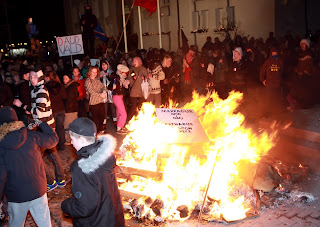The Pots and Pans revolution of 2009
The crash, when it came, was dramatic.
The global financial crisis of 2008 didn’t start in Iceland. Bankers in the US found clever ways of lending too much money to mortgage borrowers who couldn’t repay it, and passing these risks on to other banks throughout the world. No one could quite work out how many of these bad mortgages there were, and who ultimately held the risk. The banks didn’t trust each other. When Lehman Brothers, an American investment bank, could no longer borrow to fund its activities, it went bust. Now nobody trusted any bank. For a few days in October 2008 it looked as if the ATMs in Britain and America would stop working.
And in Iceland. The Icelandic banks were reliant on the goodwill of foreigners, and this was no longer forthcoming. They didn’t have the funds to repay international depositors who were becoming nervous. Every Icelander knows where they were on the afternoon of 6 October 2008 when Prime Minister Geir H. Haarde addressed the nation. Clearly shaken, he sowed panic among his fellow citizens. He closed the speech with the ominous words: ‘God bless Iceland.’ The banks were nationalized.
Doubt immediately fell on Kaupthing Edge and Icesave, the two Icelandic internet banks operating in London. Alistair Darling, the British Chancellor of the Exchequer, announced support for British banks, including British based subsidiaries of foreign banks, like Kaupthing Edge. But Icesave, as a branch not a subsidiary of Landsbanki, was technically the responsibility of the Icelandic government, who didn’t seem to be willing or able to guarantee their deposits.
So, at 10 a.m. on 8 October 2008, Alistair Darling announced that he was freezing the assets of Icesave. Ten minutes later, it was done. The only method Darling could employ to justify this legally was to invoke the Anti-Terrorism Act of 2001.
This was a stretch, but Darling believed that if ordinary depositors in the UK lost money in any bank, there would be a run on all the banks and the whole economic system of the country would collapse. Mr Darling saved the British financial system. Just. But he screwed Iceland, or so the Icelanders believed.
The Icelandic currency, the króna, collapsed. Many Icelanders lost all their savings. The country itself was close to bankruptcy: the British government demanded three billion euros to compensate it for repaying Icesave’s British depositors.
Like everyone else, many Icelanders had borrowed too much, but the financial fiddlers had come up with a particularly pernicious instrument of self-harm in Iceland: the foreign-currency mortgage. House buyers had borrowed in yen or Swiss francs at low interest rates. When the króna collapsed, the amount these borrowers owed tripled in local currency. There was no chance they could ever repay their loans.
Revolution!
Icelanders were furious. They were furious with the Outvaders. They were furious with the bankers. They were furious with Prime Minister Geir Haarde, and the previous prime minister and current governor of the Central Bank, Davíd Oddsson, and they were particularly furious that as a country they all owed Britain and Holland over three billion euros as a result of the activities of an internet bank they hadn’t even heard of. Being called a bunch of terrorists by Alistair Darling didn’t please them either.So they took to the streets, or rather the square. Every Saturday, throughout that winter, protesters gathered in the square in front of Parliament to protest, banging pots and pans to make a noise. Icelanders famous and not so famous spoke, singers sang, signs were waved, protests were chanted.
It’s dark for most of the day in Iceland in winter: people carried torches and lit fires to warm themselves. The crowds grew from 2,000 to 7,000. There was some violence. Food was thrown: mustard, tomato ketchup, eggs and skyr. The police made some arrests and occasionally used pepper spray and tear gas. Flagstones were thrown and two policemen went to hospital.
But, on 26 January 2009, Geir Haarde resigned. The revolution had been a success, and a relatively peaceful one at that.
If you would like to receive a free copy of my 60-page novella The Polar Bear Killing and occasional emails about my books, sign up here.
Photo by Johann Helgason via Shutterstock




Comments
Post a Comment